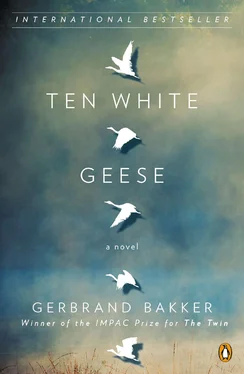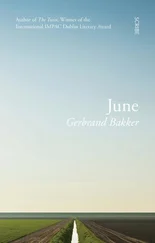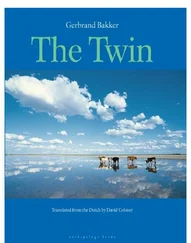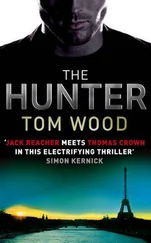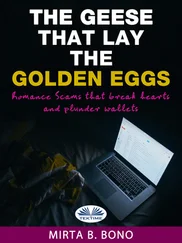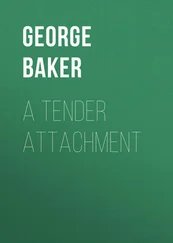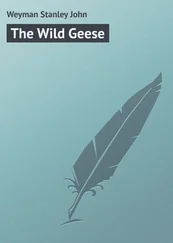The next morning there was no wind at all. Bradwen stood next to a fallen oak that was lying with its crown over the stream. He pulled on a branch, holding the saw ready in his other hand. He had already rehung the pigsty door, which had blown off its hinges. She watched him with her belly pressed against the cooker. She held the mug she had drunk tea from hours before under the tap and watered the three flowering plants on the windowsill. Sam ran across the lawn with a branch in his mouth. The cows stood at the garden wall and watched, inquisitive and skittish. She brushed some crumbs off the worktop with a flat hand and sniffed. Was it the kitchen that smelt of old woman or was it her? The coffee pot started bubbling gently.
‘I think it’s going to snow,’ the boy said when he came in. ‘It’s got cold.’
‘Uh-huh,’ she said without turning.
‘Then we’ll go to the mountain.’
‘Don’t you have to continue with your path?’
It was quiet behind her for a second. ‘Sure.’
‘But not now?’
‘Not now.’
She sighed.
‘I’ve got other things to worry about now.’
‘Such as?’
‘Rose beds. A Christmas tree.’
She turned round without moving away from the cooker. ‘A Christmas tree?’
‘Yep. It’s almost Christmas.’ He stood next to the table with his hat in his hand. His black hair was stuck to his forehead, there were oak chips on the collar of his coat. Today the L and R socks were red and blue.
‘Do I need to wash some clothes for you?’
‘You don’t need to,’ he said. ‘But I do have dirty clothes.’
‘All right, you dig and I’ll wash.’
He looked at her but didn’t speak.
‘And now I suppose you’d like some coffee.’
‘Yes, please.’ Finally he sat down.
‘Where’s the dog?’
‘Running up and down along the fence of the goose field. He’s been doing it a while.’
‘Why?’
‘No idea.’
‘Do you know anything about geese?’
‘Not really.’
She poured a coffee and put it on the table in front of him. ‘Biscuit?’
‘Yes, please. Aren’t you having one?’
‘No.’
‘Why not?’
‘Bradwen,’ she said. ‘Stop it.’
‘OK,’ he said. ‘But you haven’t said “ ach ” yet.’
She smiled and laid a biscuit next to the coffee mug. Then she walked past him to the sideboard and turned on the radio.
‘Yes,’ said the boy, just loud enough. ‘That’s another method.’
*
She was standing at the front door to ask him what he wanted washed, but the sight of his bent back restrained her. He was digging, she went to do the washing, hauling herself up the stairs with her left hand on the banister. She went into the bathroom first to take a paracetamol, then crossed the landing. It had been a few days since she’d even been in the study. It was cold, the window above the oak table was up a little. The Collected Poems lay as she’d left it, the note she’d written was a little shaky. She rested three fingers on the page and looked down into the garden. The boy was working systematically: he’d already dug up a large part of the bordered rectangle, furrow by furrow. Now he’d stuck the spade in the ground and was standing at the open door of the old pigsty, looking down into the cellar. There was steam rising from his shoulders, his coat was lying on the garden wall. What did he see there? Be its mattress straight. Since Bradwen had come, she’d hardly given Dickinson a thought. She went over to the mantelpiece, where a brown rectangle with four metal clips was leaning against the wall. Apparently there was something about the portrait the boy didn’t like. She turned it round.
From the mantelpiece, she walked to the divan to straighten the duvet. Behind the divan was a pile of clothes: jeans, L and R socks, a T-shirt, a couple of pairs of underpants. His rucksack was in the corner. She hesitated, then quickly bundled up the clothes. Before leaving the room she looked out through the small back window. The dog was still running back and forth near the geese, nose to the ground, the birds themselves huddled together near the shelter. The sky was a yellowish grey.
In the kitchen she squatted down next to the washing machine and put his clothes in one garment at a time. Whether it hung in the kitchen or seeped from the washing machine or anywhere else, the old-woman smell didn’t stand a chance against the rancid pong of his blue and grey socks. He has to go, she thought. Better today than tomorrow. To fill the machine, she stripped the bed in her room and added the duvet cover, sheet and pillowcase to the load. Be its pillow round . On the radio Wham! were singing ‘Last Christmas’.
This time the red-headed boy at Dickson’s Garden Centre had a very different look on his face. He was wandering the car park in a red Santa hat, helping where help was needed. When he saw Bradwen, who had come out of the exit just behind her carrying a Christmas tree, he stopped in his tracks. She saw him wavering: he could hardly pretend he’d been approaching someone else. It was snowing lightly. All of the garden-centre employees were wearing red Santa hats and there were decorated Christmas trees everywhere, even between the tables in the Coffee Corner. A Christmas carol was playing on the PA system. The roses had been moved to make room for racks full of candles and other Christmas paraphernalia; it took her a while to find them. After picking out twelve rose bushes, she asked Bradwen to choose a Christmas tree, but only because she thought they could plonk it in the corner, decorate it and be done. He took one with roots. That was handy, he said, because you could plant it in the garden in January. When she saw him dragging the tree through the aisles, she realised she’d need baubles and tinsel and fairy lights.
The pots with the rose bushes rattled on the big trolley; she could barely look at them. Her head was aching.
‘All right?’ the redhead asked when she walked past him. ‘Yes, I’ve got help today,’ she said, giving him a sideways glance. She heard Bradwen say, ‘Hi, mate,’ in a rather jovial tone of voice, which undoubtedly meant something. The boy looked away, scanning the car park. Sam, who was sitting in the car, began to bark excitedly.
*
Bradwen drove very carefully up the drive; the snow was an inch deep. She sat with her hands on her lap and counted the geese. All four were still there and now, because of the whiteness around them, she saw how filthy they were, how bright the orange of their beaks. The sheep were much blacker than usual. It was only when she looked ahead at the house that she saw the tyre tracks.
‘Someone’s been here,’ she said.
This time there was no note on the door.
How long since I gave those animals something to eat? she thought. Later, taking the geese a few chunks of bread, she saw that the tyre tracks ran over the field and that the sheep were crowded together near the fence.
In the morning the snow was two inches deep. The leaves of the rose bushes, which the boy had put down next to the freshly turned soil, were white.
‘I have to go to Caernarfon,’ she said after breakfast. As usual, Bradwen had eaten a lot. The coffee was just ready.
‘What are we doing there?’
‘Me.’
‘What are you doing there?’
‘None of your business.’
‘Do I need to drive?’ He tried not to look hurt.
‘No.’
He didn’t say anything else.
‘Thank you,’ she said.
‘What do I do?’
‘Please yourself. Maybe you should call your parents for once.’
He sniffed and gestured over one shoulder with a thumb at the staircase on the other side of the wall. ‘Thanks for washing my clothes.’
Читать дальше
